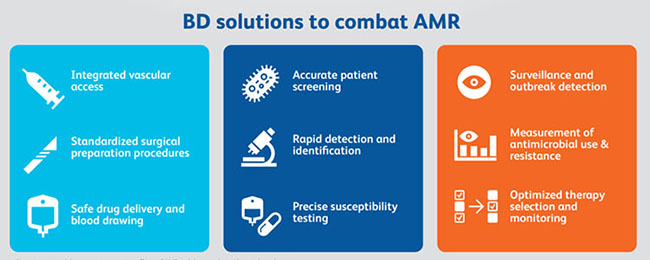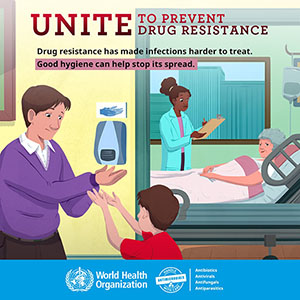World Antibiotic Awareness Week is November 18 – 24, 2020
Antibiotics can save lives and are critical tools for treating several common and more serious infections, like those that can lead to sepsis. According to the CDC, at least 47 million antibiotic prescription in U.S. doctors’ offices and emergency departments are unnecessary. Any time antibiotics are used, they can cause side effects and contribute to the development of antibiotic resistance.
Antibiotic resistance happens when germs, like bacteria and fungi, develop the ability to defeat the drugs designed to kill them. Each year in the United States, more than 2.8 million infections from bacteria that are resistant to antibiotics occur, and more than 35,000 people die as a direct result.1 Many more die from complications from antibiotic-resistant infections.
Antimicrobial resistance (AMR) is among the greatest threats to the health and well-being of the world’s population. If present trends continue, by 2050 AMR will become a greater cause of mortality than heart disease or cancer.2 As the bacteria that cause infections become increasingly drug resistant, even common medical procedures – including surgery, childbirth and chemotherapy – can become life-threatening. Decades of outmoded prescribing practices and extensive use of antimicrobials in food production have driven a rise in organisms that are resistant to these life-saving drugs.
In response to the global threat of AMR and under the guidance of the UN AMR Interagency Coordination Group, many countries throughout the world have established AMR national action plans. BD is engaging with ministries of health, international agencies, and other partners to integrate our AMR capabilities and initiatives within these country-level plans. We are doing so in a manner that appropriately aligns our actions to the stage of development of the countries and the hospitals we are working in. These actions and activities reflect the company’s strong commitment to combating the global risk of drug-resistant infections. Our efforts were recognized in 2019 by FORTUNE, earning us a spot on the publication’s Companies that Change the World list. Learn more at BD’s efforts at: http://amr.bd.com/

As an individual, we have all have a role to play to reduce the risk of drug resistant infections.

- Prevent infection by regularly washing your hands and keeping up to date with vaccinations.
- Prevent food-borne infections by washing fruits and vegetables and cooking food properly.
- Understand that antibiotics only work against bacteria. They do not work for colds and the flu, which are caused by viruses.
- Don’t pressure your health professional for antibiotics if they say you don’t need them.
- Only take antibiotics when they are prescribed for you – and don’t use or share leftovers.
- Follow your health professional’s instructions when you are prescribed antibiotics.3
References:
1. CDC. Antibiotic Resistance Threats in the United States, 2019. Atlanta, GA: U.S. Department of Health and Human Services, CDC; 2019.
2. The AMR Review. “Tackling drug-resistant infections globally: Final report and recommendations” 2016.
3. Centers for Disease Control and Prevention. Protecting Yourself and Your Family, 2018. Retrieved from https://www.cdc.gov/drugresist...
Subscribe to receive BD blog alerts